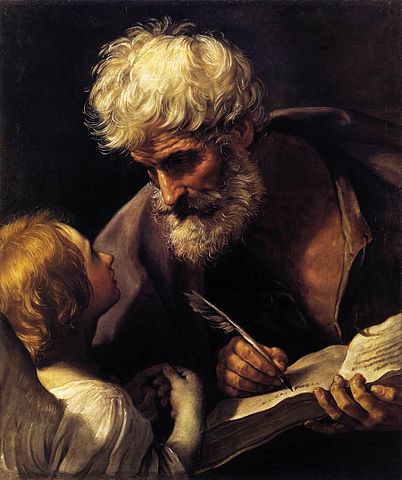Feast of St. Matthew, apostle, evangelist and martyr (21 September)
|
At the time that Jesus summoned him to follow Him, Matthew was a publican (tax-collector) for the Romans. His profession was hateful to the Jews because it reminded them of their subjection; the publican, also, was regarded by the pharisees as the typical sinner. St. Matthew is known to us principally as an Evangelist and his gospel is the first book of the New Testament.
No-one was more shunned by the Jews than a publican, who was a Jew working for the Roman enemy by robbing his own people and making a large personal profit. Publicans were not allowed to trade, eat, or even pray with others Jews. One day, while seated at his table of books and money, Jesus looked at Matthew and said two words: "Follow me." This was all that was needed to make Matthew rise, leaving his pieces of silver to follow Christ. His original name, "Levi," in Hebrew signifies "Adhesion" while his new name in Christ, Matthew, means "Gift of God." The only other outstanding mention of Matthew in the Gospels is the dinner party for Christ and His companions to which he invited his fellow tax-collectors. The Jews were surprised to see Jesus with a publican, but Jesus explained that he had come "not to call the just, but sinners." Not much else is known about Matthew. According to tradition, he preached in Egypt and Ethiopia and further places East. Some legends say he lived until his nineties, dying a peaceful death, others say he died a martyr's death. |
The Western church celebrates the feast of St. Matthew on 21 September, while it is celebrated on 16 November in the Eastern Rite.
In the traditional symbolisation of the evangelists, based on Ezekiel 1:5–10 and Revelation 4:6–7, the image of the winged man is accorded to Matthew because his Gospel begins with the human genealogy of Christ. In art, Matthew is often depicted with an angel and a book.
Patron: Accountants; bankers; bookkeepers; customs officers; security guards; stock brokers; tax collectors; Salerno, Italy.
Symbols: Angel holding a pen or inkwell; bag of coins; loose coins; halberd; inkwell; king; lance; man holding money; man holding money box and/or glasses; money bag; money box; purse; spear; sword; winged man; young man; book; man sitting at a desk.
Ways to honour St. Matthew
In the traditional symbolisation of the evangelists, based on Ezekiel 1:5–10 and Revelation 4:6–7, the image of the winged man is accorded to Matthew because his Gospel begins with the human genealogy of Christ. In art, Matthew is often depicted with an angel and a book.
Patron: Accountants; bankers; bookkeepers; customs officers; security guards; stock brokers; tax collectors; Salerno, Italy.
Symbols: Angel holding a pen or inkwell; bag of coins; loose coins; halberd; inkwell; king; lance; man holding money; man holding money box and/or glasses; money bag; money box; purse; spear; sword; winged man; young man; book; man sitting at a desk.
Ways to honour St. Matthew
- Do something for the needy: money for missions, donations of clothing or toys, canned goods drive, etc.
- Take time to read St. Matthew's Gospel, keeping in mind that St. Matthew depicts the humanity of Christ and emphasises His physical sufferings. He makes frequent reference to the fulfilment of prophecies because he wrote to Jews and to Jewish Christians.
- Consider St. Matthew's call from Christ "Follow me" and how we are all called to belong to the family of God.
- Pray for people who work for financial institutions.
